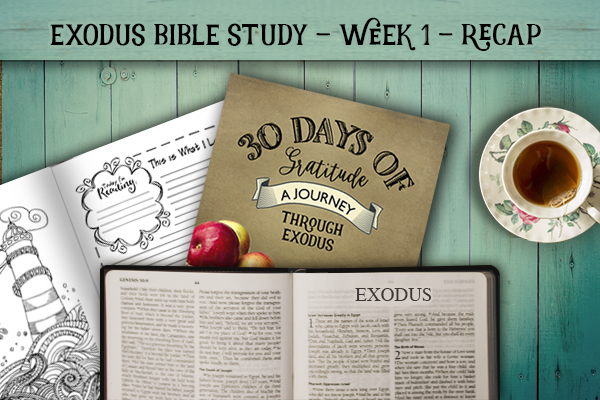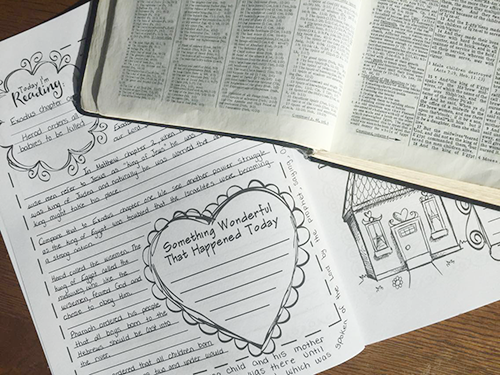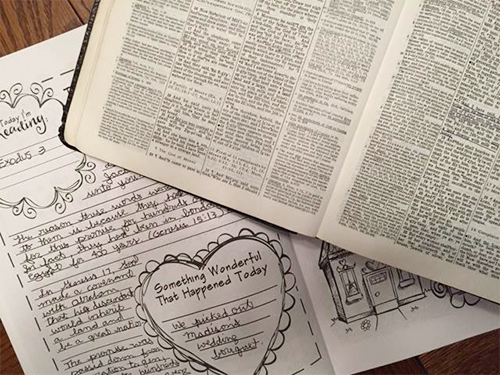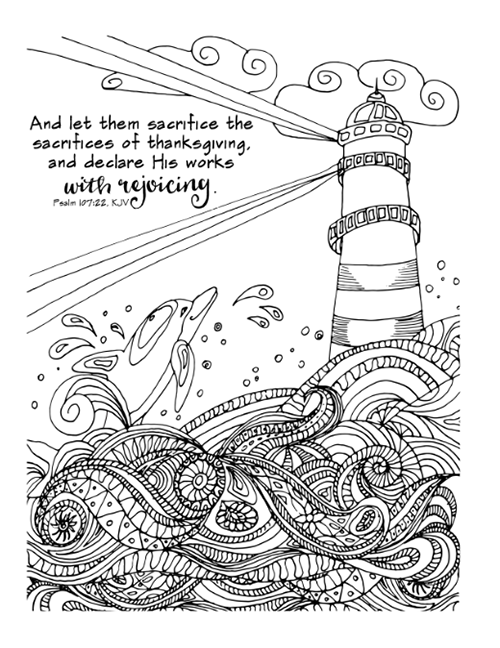
Week 1 – Exodus chapters 1-4
There was so much to unpack this week, wasn’t there? This study had me digging deeper than any other study we’ve had in the past. Wow! I’ve been learning so much about Moses, and the Hebrews, and the Levites. I’ve was led to Matthew chapter 2 one day and all the way back to Genesis the next. With all of the researching I found myself refreshed at the end of each study. God is good!
Take a look at my notes on each chapter below. Grab a copy of the coloring page below too, and then head over to my facebook page to share your thoughts on what you’ve been learning so far!
You are loved by an almighty God,
Darlene Schacht
The Time-Warp Wife
P.S. Don’t forget to join in our 30 days of gratitude each day. You can find those posts on my facebook page too!

Exodus 1 – Moses is Protected by God

Shown above Quieting Your Heart: Gratitude Journal, available at Amazon (affil link)
Exodus chapter one reminds me of Matthew chapter 2 in so many ways. It’s really interesting, because to me the entire story of Exodus parallels a believer’s conversion. It’s absolutely incredible that the birth of this Exodus would parallel the birth of our Lord Jesus Christ.
In Matthew chapter 2, when Herod heard the wise men refer to Jesus as “King of the Jews” he was troubled. Herod was king of Judea and naturally he was worried that another king might take his place.
Compare that to Exodus chapter one. We see another power struggle as the king of Egypt was troubled that the Israelites were becoming a strong nation.
Herod called the wisemen. The king of Egypt called the midwives, who like the wisemen, feared God and chose to obey Him.
Pharaoh ordered his people that all boys born to the Hebrews should be cast into the river.
Herod ordered that all children born in Bethlehem ages two and under would be killed.
God protected Moses, and He protected Jesus so that His people would be free.
After being warned in a dream about Herod’s evil plan to destroy Jesus. Joseph and Mary went to Egypt to wait until God gave them the assurance that they would be safe.
“When he arose, he took the young child and his mother by night, and departed into Egypt: and was there until the death of Herod: that it might be fulfilled which was spoken of the Lord by the prophet, saying, Out of Egypt have I called my son.” Matthew 2:14-15
Isn’t the Bible incredible?! There are so many layers that are waiting to be uncovered. I can’t wait to dig into chapter two!

Exodus 2 – Moses is Protected by God
Sometimes when I’m studying the Bible I notice something small, maybe it isn’t all that significant, but it causes me to dig and to think and to pray for understanding. So give me a little wiggle room today as I head off on a rabbit trail…
In verse 1 of Exodus chapter 2, we see that both Moses’ mom and his dad were Levites. This is significant because further into the book of Exodus we see that Levites were set apart and that Aaron’s son’s were consecrated for the priesthood. In fact a book of the Bible, “Leviticus,” is named after this tribe.
So I got to wondering why He chose Aaron (the older brother) for the priesthood, when He could have chosen Moses (other than the obvious fact that Aaron was born first). Moses was the one who led the people across the red sea. Moses is the one that God used to free His people. Moses is at the center of this story. He’s the one that’s speaking directly to God and passing the law down to His people. He’s the one who’s typifying Christ in so many ways.
Then I also got to wondering why Jesus wasn’t from the tribe of Levi. He was from the tribe of Judah, which gave Him authority to also be the King of Judah. But God doesn’t leave ends untied. There’s a reason He does everything, so I dug a little deeper. That’s when the light bulb went on.
Moses wasn’t a priest, but He was given the authority to ordain the first priest. He was given the authority to set up the tabernacle and to consecrate the priests. He was the mediator between God and man. He was given the authority to sanctify his people. And God spoke with Moses in the Holy of Holies (Numbers 7:89).
“And Moses took the anointing oil, and anointed the tabernacle and all that was therein, and sanctified them. And he sprinkled thereof upon the altar seven times, and anointed the altar and all his vessels, both the laver and his foot, to sanctify them. And he poured of the anointing oil upon Aaron’s head, and anointed him, to sanctify him.” – Leviticus 8:10-12
The only other person given this kind of authority in scripture is Jesus Christ. Jesus was not a priest ordained of men, but was given the authority to be a high priest from God the Father.
“Called of God an high priest after the order of Melchisedec.” – Hebrews 5:10
Keep in mind that while I make a comparison here, I’m in no way equating a prophet with Our Lord. Moses wasn’t perfect, he was simply a man used of God in miraculous ways. He was a foreshadow of someone much greater.
His parents knew that he was special and so they hid him, until they could hide him no more.
Laying Moses inside a basket and putting him into the water was an act of faith. They had no idea if someone would find him, and even if he was found whether he would be put to death as the other babies had been.
The orchestration by God is beautiful in this chapter as we see Him abundantly bless them beyond anything they could have imagined for themselves. Not only does He spare Moses’ life, provide him a home, and place him exactly where He wants Moses to be, He also arranges for Moses’ own mother to nurse him.
“Now unto him that is able to do exceeding abundantly above all that we ask or think, according to the power that worketh in us, unto him be glory in the church by Christ Jesus throughout all ages, world without end. Amen.” – Ephesians 3:20-21

Exodus 3 – The Burning Bush

Shown above Quieting Your Heart: Gratitude Journal, available at Amazon (affil link)
In Exodus 3 we see God tell Moses, “Thus shalt thou say unto the children of Israel, The Lord God of your fathers, the God of Abraham, the God of Isaac, and the God of Jacob, hath sent me unto you.
The reason these words were important to them is because they had been waiting for this promise for hundreds of years. In fact, they had been in bondage in Egypt over 400 years.
In Genesis chapter 17, God made a covenant with Abraham, “And I will make thee exceeding fruitful, and I will make nations of thee, and kings shall come out of thee. And I will establish my covenant between me and thee and thy seed after thee in their generations for an everlasting covenant, to be a God unto thee, and to thy seed after thee. And I will give unto thee, and to thy seed after thee, the land wherein thou art a stranger, all the land of Canaan, for an everlasting possession; and I will be their God.” Genesis 17:6-8
This promise was passed down from generation to generation, but after hundreds of years, they were still waiting for the promise to come to fruition.
What we should learn from this is the importance of patience. God doesn’t necessarily answer our prayers today or tomorrow, but we can be certain that He’s always at work. We can trust in His promises because He is faithful, but first we must master the virtue of patience as we wait on His timing in lieu of our own.

Exodus 4 – Moses Prepares to Lead

Today’s Coloring Page
Click here to view and print your copy

